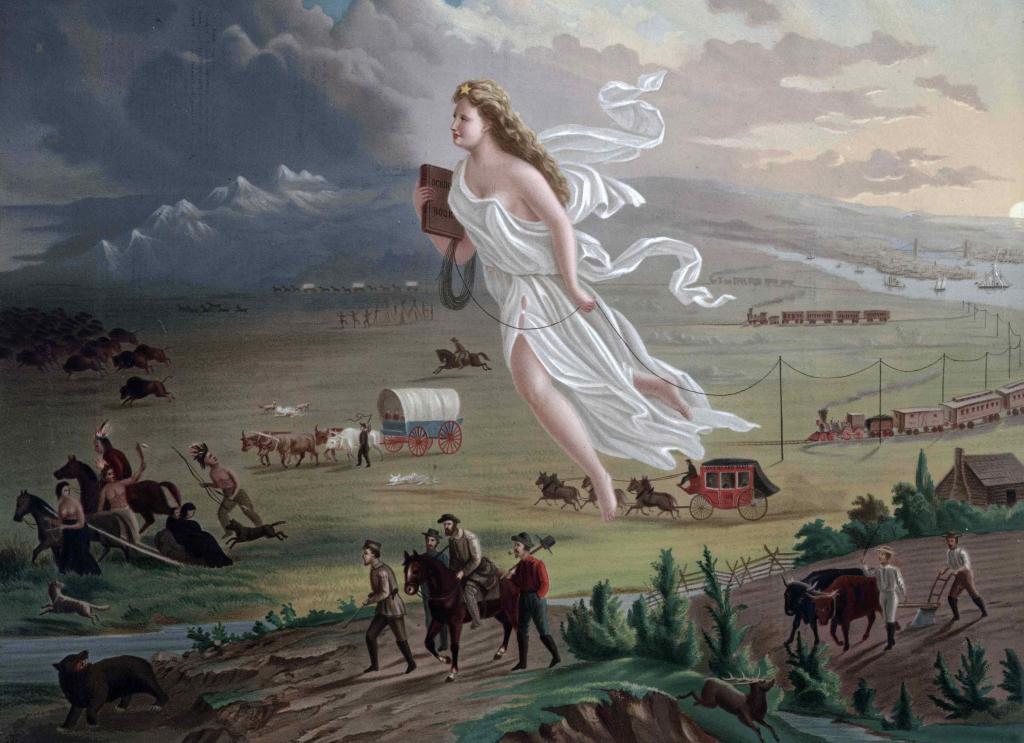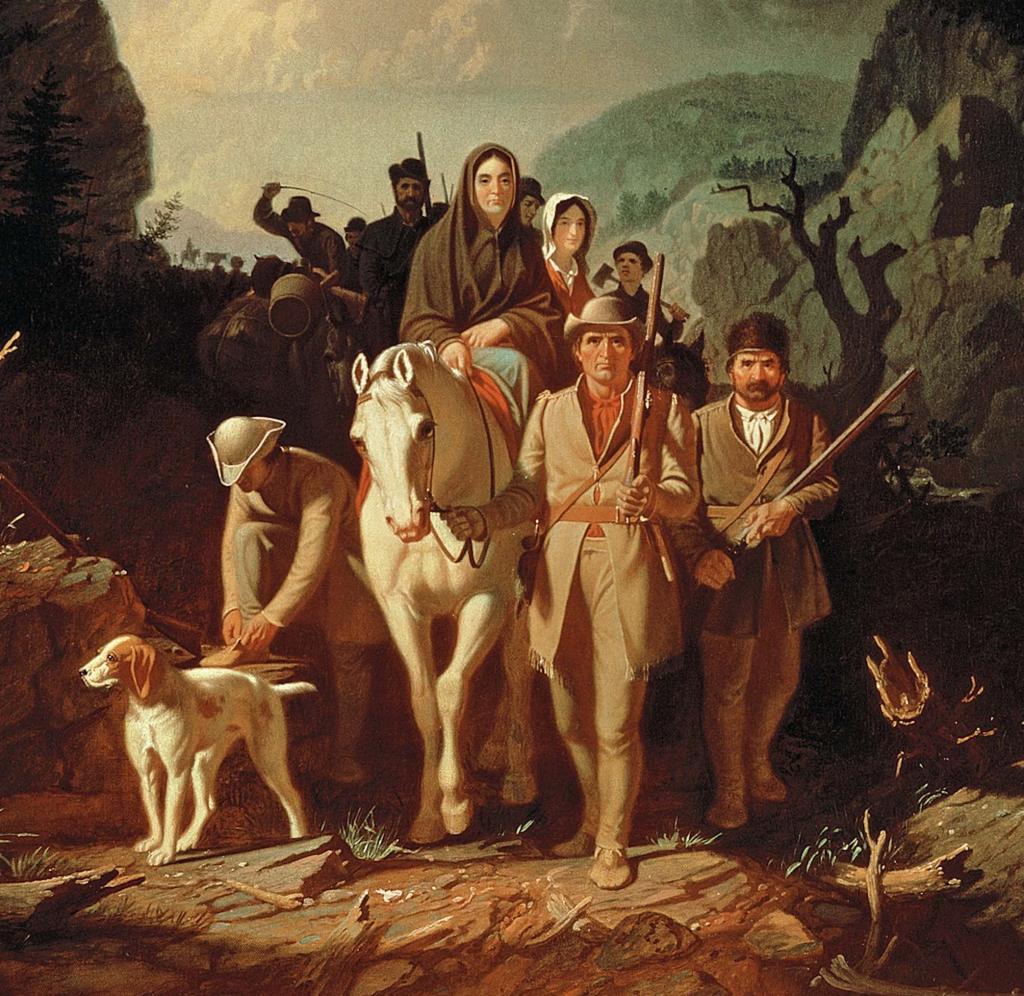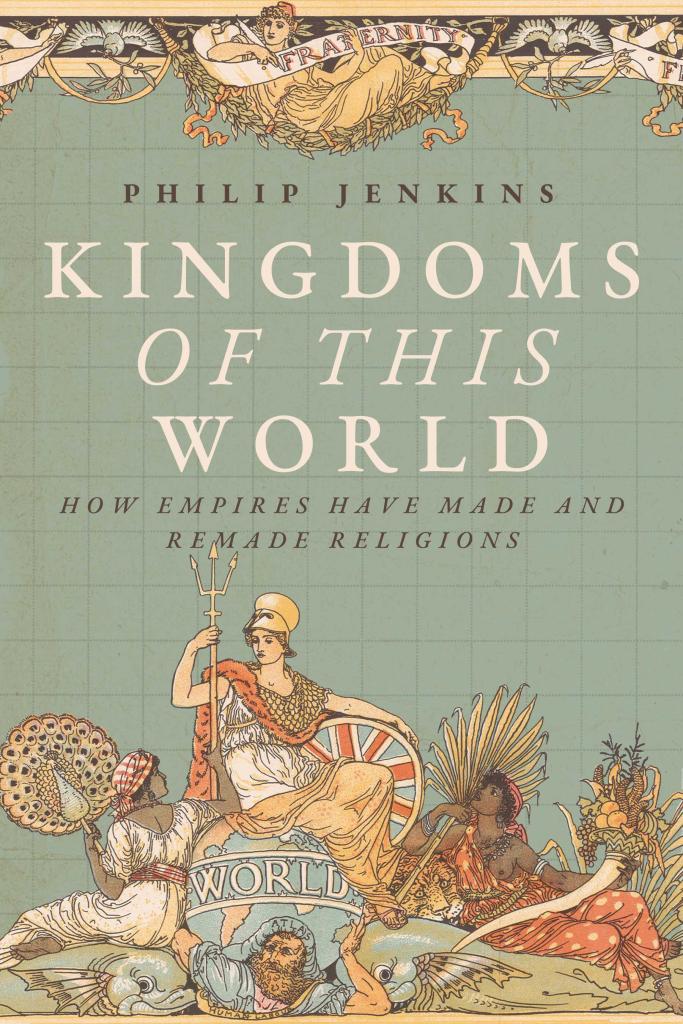I have posted several items on the idea of empire as it applies to American history. Although a generation ago, even to speak of American empire was contentious and provocative, today it is an absolutely standard way of understanding national history from earliest times, and also – my particular interest – its religious history. But I should be more specific. Empires are by no means a one size fits all model, as they take various forms, and one of those forms in particular demands special attention in the US context. This is the settler colonialism theme which I will describe in detail shortly, and which will form the subject of my next couple of blogposts.
I had been planning such a column for a while, but I received a direct jab from the Mystic Forces of the Universe last weekend when I encountered a major piece in the Wall Street Journal, which excerpted the brand new book by Adam Kirsch, On Settler Colonialism: Violence, Ideology and Justice (New York: W. W. Norton 2024). I really mean brand new – it was officially published on Tuesday (!). Kirsch also has an article in the latest Atlantic, on what he calls “The False Narrative of Settler Colonialism.” Obviously, then, this is a hot topic and, as I will show, rightly so, to the point of being essential to understanding American history. My own current work, I think, presently constitutes the only application of that theory to American religious history.
I make one thing clear from the start. I find the settler-colonialism perspective valuable, and often illuminating. But as I will show, some of its features are controversial, and that includes some of its most basic terminology. I thus accept the core idea, without necessarily following some of the weird flourishes that have characterized the theoretical literature. Regard this column as an opening phase of what I hope will be a continuing debate.
Rulers and Settlers
Empires have been extremely common through human history, to the point of being the default form of government in most eras. But historians distinguished between particular manifestations of empire in terms of the impact they make on conquered societies. Historically, many empires have been content to extract tribute or taxes from an occupied territory, or to exploit its economic resources, without making any attempt to establish a presence of the dominant imperial race. In some instances, they merely establish a strategic military presence. In that sense, British rule in India had nothing to do with colonialism: there was never any deliberate policy to build up British communities or towns, as opposed to having bureaucrats, soldiers, or merchants who happened to live there. At the time of the Indian Mutiny in 1857, the British population of India – military and civilian combined – was scarcely forty thousand, out of a total of two hundred million. The rulers make minimal efforts to change the ways of their subjects, and might even limit the activities of zealous missionaries who try to introduce provocative alien ways. Let me call this the imperial hegemony model.
But then, in contrast, there are colonies, which involve not just occupying a territory but settling it, usually with the people of the imperial motherland. The terminology dates back to the Roman practice of establishing settlements, or coloniae, of military veterans in conquered lands, which reduced the need to pay those soldiers in cash. Those settler/colonial centers serve as hubs to spread new values, customs, and languages. The coloniae projected Roman culture and order onto the new land, and opened the way to wider settlement not directly associated with those specific centers. In other more sweeping instances, empires thoroughly resettle their newly acquired lands with populations from the homeland, creating new colonies where older populations are marginalized or even destroyed. Empires take symbolic possession of the lands they rule through acts of naming and renaming, mapping and remapping.
This settler colonialism model has been the subject of intense scholarly work in recent years. That kind of settlement what occurred, successfully, in Australia and Canada, and in a failed or abortive form in Algeria and South Africa. It was also the model that prevailed in the metropolitan United States, the Lower Forty-Eight states. The literature on settler colonialism, and on American forms of that concept is now very substantial. At the end of the present post, I include my very selective working bibliography of major publications, and you will see how very recent are most of these items – mainly from the last decade or so. The journal Settler Colonial Studies is now in its fourteenth year.
Settling America
The distinction between imperial hegemony and settler colonialism is vital to understanding American history. Indeed, we can even see the foundation of the United States as a contest between those rival concept of empire. When the British established control over much of the Eastern seaboard in the 1760s, they happily contemplated ruling over multiple societies and language groups, including white Anglo settlers but also Natives, French, and others, all of whom would coexist under an over-arching imperial authority. In that familiar setting, imperial rulers would happily balance competing interests, dividing and ruling. In practice, that would mean preventing any further efforts by the settlers of the Thirteen Colonies to undertake mass migrations into the interior, conquering and removing Native peoples. Those policy differences were a central factor in detonating the Revolution, in which the settler colonialism model was firmly asserted – as it would be again during the War of 1812.
As “everyone knows,” the thirteen British colonies in America rebelled in 1776, but that really is not true. It is sobering to recall that at this time, the British Empire mustered not thirteen colonies in the New World, but 26. Besides the thirteen that became the United States, there were four others that ultimately joined Canada, in addition to six in the Caribbean, as well as Bermuda, and the twin lands of East and West Florida, which together makes up 26 in all. Of those 26, then, just half rebelled. The critical difference between the two categories, the seceders and loyalists, was that the former category had high hopes of limitless expansion and settlement – in short, of pursuing dreams of settler colonialism. Other colonies, such as Jamaica or Barbados, were equally pledged to empire, but imagined in radically different ways, with small white minorities presiding over very large populations drawn from other races.
In the new United States, the settler colonial model triumphed, to the point of achieving a near-total replacement of older groups. By 1930, the reported Native population of the US and Alaska was just 360,000, out of an overall national population of 123 million. Claims that Indians faced extinction – the much discussed “end of the trail” – did not seem far-fetched.
Theory and Ideology
In many ways, the settler colonial model supplies a common and valuable lens for understanding American history. But as Adam Kirsch notes, much of the recent literature makes much more ambitious claims. In these writings, the whole concept is very difficult to apply in any kind of objective or non-controversial way, and “settler colonialism is best understood not as a historical concept but as an ideology.” Arguably, the very word “settler” is tainted beyond redemption.
Much recent literature offers a radical critique of existing Western societies. In this view, the settler/colonial origin story casts a very long shadow, to the point of shaping the whole history of that new country, and that is especially evident in matters of race and privilege. To quote the Australian scholar Patrick Wolfe, “settler colonizers come to stay: invasion is a structure not an event [my emphasis].” For Adam Kirsch,
What is new about settler colonialism is the idea that this original injustice is being renewed at every moment through various forms of oppression, some obvious, others invisible. Because settlement is not a past event but a present structure, every inhabitant of a settler colonial society who is not descended from the original indigenous population is, and always will be, a settler…. Settler, in this view, is not a description of the actions of an individual but a heritable identity. In fact, it’s not even necessary to be the lineal descendant of an original dispossessor to qualify as a settler. Because settler colonialism is a structure, every nonindigenous person who occupies a place in that structure plays the role of settler, whether their ancestors arrived on the Mayflower or on a flight to LAX.
To be clear, that is, every non-indigenous person in the US, including all Blacks, Latinos, Asians, and very recent immigrants. We are all settlers. Such a classification is so expansive as to raise real doubts about the value of the underlying theory.
Israel and the US
The implications can be far-reaching, and by no means only in the American instance. In fact, the primary inspiration for Kirsch’s current book is the competing interpretations that are offered of the conflict in Israel/Palestine, and specifically the Palestinian attacks of October 7, 2023. Kirsch was evidently shocked by the sympathy for such actions among many Americans, who viewed the violence as an understandable and even legitimate response to (Israeli) colonial exploitation. His Atlantic article carries the subtitle “The rise of an academic theory and its obsession with Israel.”
The language needs unpacking. From a Palestinian point of view, all Jewish residents who immigrated after 1900 or so are settlers, who built a colonial regime in their land. In this view, the whole state of Israel is a colonial venture, one of the last vestiges of the old European imperial system. Zionism, of its essence, is grounded in imperialism, colonialism, and racism. Palestine’s older ethnic and religious structures were not just condemned, they became invisible, in a colossal act of erasure and public amnesia of a kind familiar to settler/colonial regimes around the world. For Israelis, in contrast, that settlement was a homecoming, and in no sense can or should it be counted as a colonial venture. In fact, as Israelis are quick to tell you, their national independence was established in a revolutionary war against an imperial power, namely the British Empire. “Settler colonialism?” they would say: nonsense! The two perspectives – Zionist and anti-Zionist – are irreconcilable.
Kirsch is absolutely and unquestioningly committed to the Zionist reading, for which he seeks to enlist American support. The book’s unsubtle goal is to convince Americans that they cannot accept the critique of Israel without facing a similar delegitimization of their own country, and all its familiar rhetoric:
To put it briefly and as neutrally as possible, describing the United States and Israel as settler colonial societies is a way of arguing that they are permanently illegitimate, because they were created against the will of the people previously living there – Native Americans and Palestinian Arabs.
All analogies limp, and we might well counter here that the settler/colonial model actually applies to the Palestine situation more plausibly than it does to the North American.
Settler Debates
But why are these concepts of settler and colonial so sensitive? It helps here to think of two historical examples, one of which should be very familiar to most Americans over the age of forty or so, the other is far less so.
The less familiar example today is that of the French experience in Algeria, which in fact was one of the most important historical events of the past century in terms of shaping ideology and political thought. Briefly, the French conquered Algeria from the 1830s onward, and encouraged a mass immigration of White European immigrants. By the 1950s, those migrant settler populations constituted at least a million people, out of a total population of ten million, the remainder being Muslim and Arab. Legend told how those eager settlers had scrambled ashore from the ships, getting their feet black with mud – hence the nickname, pieds noirs.
During the 1950s, the Arab revolutionary movement secured national independence (which was finally achieved in 1962). The campaign pioneered modern forms of urban guerrilla warfare and terrorism, as portrayed in the very influential film The Battle of Algiers. It also proved a vital stimulus to anti-colonial and Third World ideologies, which stood in sharp contrast to the then popular division between capitalism and Communism. The very influential theorist Frantz Fanon wholeheartedly justified revolutionary violence against the settlers and colonists, which had a liberating quality. Jean-Paul Sartre concurred, declaring that in this context, to kill a European colonist is to kill two birds with one stone, at the same time to destroy an oppressor and the man he oppresses. By the act of killing, the colonized person liberates himself, and becomes a newly created person, a free man. At the end of the war, virtually all the “settlers” – the White Europeans, the colons, the pieds noirs – were expelled from the new Algeria. They were frankly offered a choice between “the suitcase and the coffin.” The campaign laid the foundation for the nascent Palestinian resistance movement, which hoped to repeat the Algerian experience on their own occupied country.
Radicals learned harsh lessons from the the Algerian experience and its anti-colonial manifestations. According to this view, settlers represent the wrong side of history. Of their nature, regardless of their individual character, they are accomplices to all the crimes of imperial exploitation. In any kind of violent struggle, it is simply wrong to equate the harms or crimes done by settlers and colonists to those committed by revolutionaries. The very words settler and colonist are scarcely distinguishable from other terms suggesting overt violence and aggression, such as invader. One theme running through the current literature on the topic is the violence that seems intrinsic to settler colonialism, which commonly targets indigenous people, and which can extend to outright genocide. People can and should resist invaders: so why not settlers?
The other and better-known experience was that of South Africa, where a White minority regime held power until 1994. The liberation war here was far less bloody than Algeria, and large portions of the White population remained in the country after its liberation. Even so, a similar rhetoric prevailed. The White population were settlers and colonists, and by implication had no right to hold wealth, status or power in that occupied land. Pro-Palestinian settlement is very strong among Black South Africans, especially in the main party that led the revolutionary movement, the African National Congress. No less obviously, Israelis and supporters of Zionism worldwide are appalled at any analogy that might be drawn between the two situations.
When is a Settler Not a Settler?
Every word in this literature is loaded. If someone is a settler, does that mean that they become proper and legitimate targets of revolutionary violence? If I said “On October 7, 2023, Palestinian guerrillas killed over a thousand Israeli settlers,” I would undoubtedly be accused of justifying the acts. Settler is not a neutral term.
Even if we are not speaking of violence, surely to speak of settler colonialism implies many powerful value judgments. In modern eyes, there can be no good settler colonialism, any more than benevolent imperialism. If I acknowledge such a situation in country X, then that surely demands some kind of action, or activism, which might extend to granting reparations to colonized peoples, and to struggling to rewrite historical memory. Am I delegitimizing the whole nation, the whole society? If we apply that approach to Israel, are we logically bound to extend a like condemnation to the United States? Such approaches might seem admirable to some, but they make it difficult to use the settler colonial idea in any way consistent with objective social science.
Many years ago, I owned a button that parodied all the political slogans about “US out of Country X!” It said simply “US Out of North America!” At the time, I thought it was a joke, but that is not far from being an accurate summary of at least portions of the settler-colonialism literature.
Also, how do we define the non-settler populations? That seems easy enough. We might speak of Native or Indigenous peoples, or aborigines (with a small-a, as the upper-case term implies the specific case of Australian Aborigines). In recent years, academic institutions in particular have added “land acknowledgments” to their public statements, declaring that their campuses stand on the “original homelands” of various “indigenous peoples.” By implication, the institutions themselves are admitting their status as settlers.
Think those terms through. “Native” simply means “someone who was born there”: Native, as in “Nativity.” Although the etymology is not as self-evident, indigenous actually has the same meaning. It is a Latin term, for someone who was “born within,” that is, in the particular land. I stress, born. Of its nature, neither term says anything about more remote ancestry. I, for instance, am an immigrant to the United States, but my children were born in the country, in Pennsylvania. Technically, then, both are natives and indigenous, and both terms are precisely and literally correct. My children would however run into trouble if they described themselves as native Americans, or as indigenous Pennsylvanians, even if they did not use upper case letters. So are they settlers? They certainly are not immigrants.
If that seems like a verbal quibble, think of the cases I mentioned earlier, the “classic” anti-colonial struggles in Algeria in South Africa. In the latter case, many of the White Afrikaaners could trace their residence in the land back for eight or ten generations – a significantly longer time, in fact, than most modern Americans can look back in their country. Many of the European colonists in Algeria had three or four generations in that country. Yet that did not prevent them being treated as invaders and being offered “the suitcase or the coffin.”
So is there a point at which settlers cease to be settlers, and become indigenous? When is that? Is there a point at which a country founded by settler colonialism loses that status? When is a settler not a settler? In the case of the United States: are we there yet?
In this post, I have outlined the idea of settler colonialism, and suggested why it is so vital for understanding US history. Next time, I will focus on the specifically religious aspects of the story, where imperial themes are no less critical.
(VERY) SELECTED REFERENCES
Mohamed Adhikari, Civilian-Driven Violence and the Genocide of Indigenous Peoples in Settler Societies (Routledge 2021)
Maile Arvin, Possessing Polynesians: The Science of Settler Colonial Whiteness in Hawaii and Oceania (Durham, NC: Duke University Press, 2019)
James Belich, Replenishing the Earth: The Settler Revolution and the Rise of the Angloworld, 1780–1939 (New York: Oxford University Press, 2009)
Kevin Bruyneel, “Review Essay: On Settler Colonialism,” The Review of Politics, 82(1)(2020): 145 – 157
Kevin Bruyneel, Settler Memory: The Disavowal Of Indigeneity And The Politics Of Race In The United States (Chapel Hill: The University of North Carolina Press, 2021)
John H. Cable, Southern Enclosure: Settler Colonialism And The Postwar Transformation Of Mississippi (Lawrence: University Press of Kansas, 2024)
Edward Cavanagh and Lorenzo Veracini, eds., The Routledge Handbook of the History of Settler Colonialism (Abingdon, UK: Routledge, 2017)
Annie Coombes, ed., Rethinking Settler Colonialism: History And Memory In Australia, Canada, Aotearoa New Zealand And South Africa (Manchester University Press, 2006)
Sai Englert, Settler Colonialism: An Introduction (London: Pluto Press, 2022)
Walter L. Hixson, American Settler Colonialism: A History (New York: Palgrave Macmillan, 2013)
Gerald Horne, The Apocalypse of Settler Colonialism: The Roots of Slavery, White Supremacy, and Capitalism in Seventeenth-Century North America and the Caribbean (New York: Monthly Review Press, 2018)
Tariq D. Khan, The Republic Shall Be Kept Clean: How Settler Colonial Violence Shaped Anti-Left Repression (Urbana: University of Illinois Press, 2023)
Adam Kirsch, On Settler Colonialism: Violence, Ideology and Justice (New York: W. W. Norton 2024)
Lachlan McNamee, Settling for Less: Why States Colonize and Why They Stop (Princeton University Press, 2023).
F.Evan Nooe, Aggression And Sufferings: Settler Violence, Native Resistance, And The Coalescence Of The Old South (Tuscaloosa: The University of Alabama Press, 2024)
Susan Pedersen and Caroline Elkins, eds., Settler Colonialism in the Twentieth Century: Projects, Practices, Legacies (Routledge, 2005).
“Settler Colonialism in Early American History,” William and Mary Quarterly 76(3)(2019), special issue. Contents are listed here.
Lorenzo Veracini, Settler Colonialism: A Theoretical Overview (New York: Palgrave Macmillan, 2010)
Tisa Wenger and Sylvester A. Johnson, eds., Religion and US Empire: Critical New Histories (New York: New York University Press, 2022)
Patrick Wolfe, Settler Colonialism and the Transformation of Anthropology: The Politics and Poetics of an Ethnographic Event (London: Cassell, 1998)
Patrick Wolfe, “Settler Colonialism And The Elimination Of The Native,” Journal of Genocide Research 8.4(2006) 387-409
See also my full bibliography on American Empire here.















